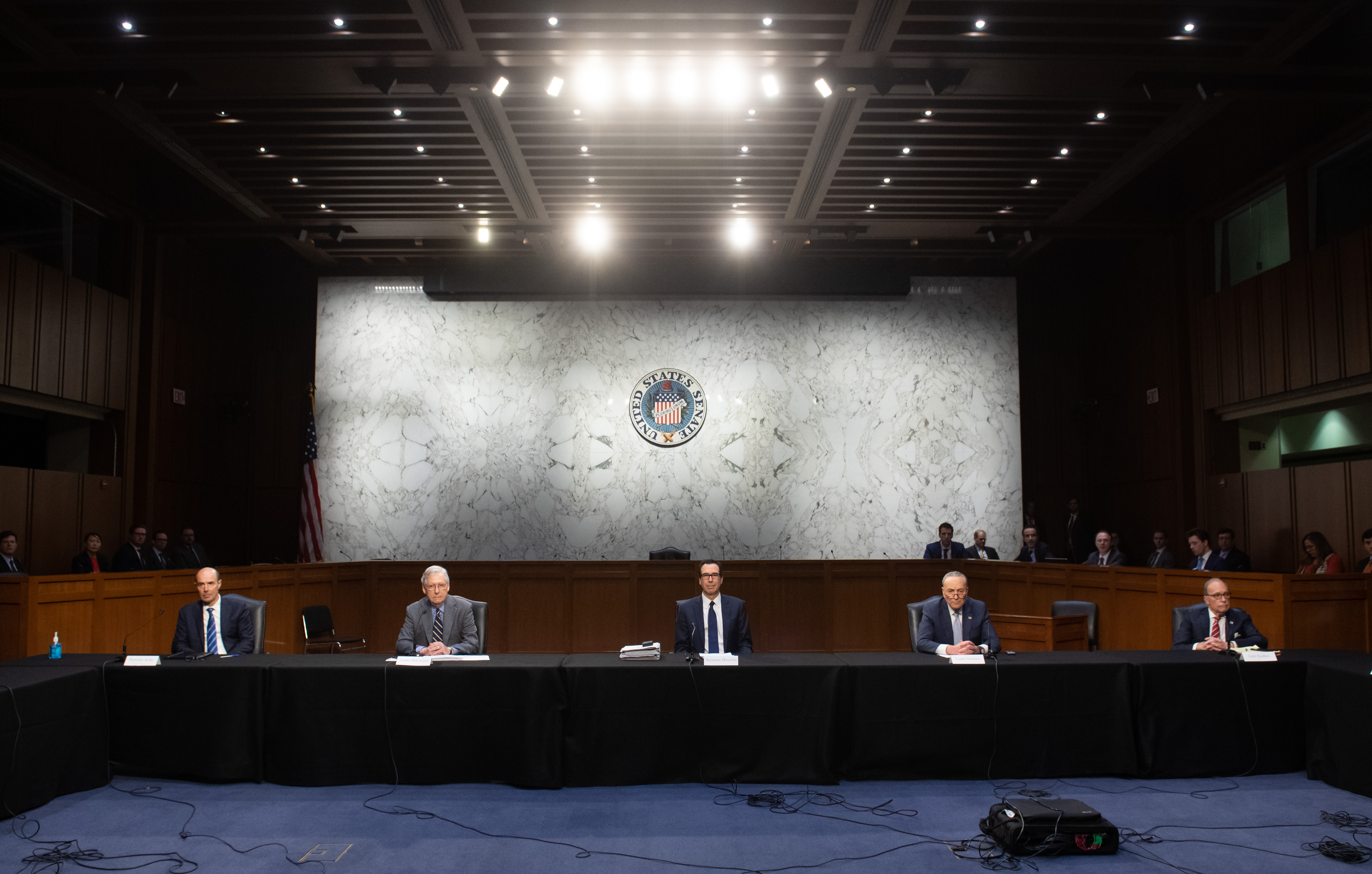Senate halts $1.8 trillion GOP coronavirus bill over corporate 'slush fund,' worker firing concerns


A free daily email with the biggest news stories of the day – and the best features from TheWeek.com
You are now subscribed
Your newsletter sign-up was successful
The Senate voted 47-47 on a $1.8 trillion bill to shore up the economy during the COVID-19 coronavirus epidemic, far short of the 60 votes needed to advance the legislation. Senate Majority Leader Mitch McConnell (R-Ky.), who wrote the bill Saturday night, vowed Sunday night to bring it up for a vote again at 9:45 Monday morning, repeatedly daring Democrats to vote against it again as the stock market plummets further. Senate Minority Leader Chuck Schumer (D-N.Y.) said no. Negotiations continued overnight.
Republicans are "throwing caution to the wind for average workers and people on Main Street and going balls to the wall for people on Wall Street," Sen. Joe Manchin (D-W. Va.) said Sunday. Schumer laid out most of the Democratic concerns about the legislation, which The Washington Post calls "by far the largest financial rescue ever attempted by Congress," earning a three-word response from Sen. John Cornyn (R-Texas).
But Democrats weren't the only ones concerned that the legislation gives too much to large corporations while demanding too little in return. "Any relief for big corporations must limit executive compensation, ban stock buybacks, and require companies to pay back loans w/ interest. Or I'm not voting for it," Sen. Josh Hawley (R-Mo.) tweeted. Democrats voiced special concern about the $500 billion available to large companies with little oversight, including $425 million to be doled out at the discretion of Treasury Secretary Steven Mnuchin, the recipients able to shield their identities for six months.
The Week
Escape your echo chamber. Get the facts behind the news, plus analysis from multiple perspectives.

Sign up for The Week's Free Newsletters
From our morning news briefing to a weekly Good News Newsletter, get the best of The Week delivered directly to your inbox.
From our morning news briefing to a weekly Good News Newsletter, get the best of The Week delivered directly to your inbox.
"We're not here to create a slush fund for Donald Trump and his family, or a slush fund for the Treasury Department to be able to hand out to their friends," Sen. Elizabeth Warren (D-Mass.) said Sunday. Democrats also want the funds contingent on companies retaining 90 percent of their workers, not just "to the extent practicable," as McConnell's legislation allows. New York Times economic columnist Binyamin Appelbaum found that point the most baffling.
House Speaker Nancy Pelosi (D-Calif.) said "we're so far apart," the House will "be introducing our own bill and hopefully it will be compatible" with the Senate deal.
A free daily email with the biggest news stories of the day – and the best features from TheWeek.com
Peter has worked as a news and culture writer and editor at The Week since the site's launch in 2008. He covers politics, world affairs, religion and cultural currents. His journalism career began as a copy editor at a financial newswire and has included editorial positions at The New York Times Magazine, Facts on File, and Oregon State University.
-
 The Week Unwrapped: Have televised confessions quelled protests in Iran?
The Week Unwrapped: Have televised confessions quelled protests in Iran?Podcast Plus, why has Elon Musk turned from Mars to the Moon? And will the BBC prove to be a puzzles champ?
-
 The week’s best photos
The week’s best photosIn Pictures An Andean god, a rogue squirrel, and more
-
 ‘Zero trimester’ influencers believe a healthy pregnancy is a choice
‘Zero trimester’ influencers believe a healthy pregnancy is a choiceThe Explainer Is prepping during the preconception period the answer for hopeful couples?
-
 TikTok secures deal to remain in US
TikTok secures deal to remain in USSpeed Read ByteDance will form a US version of the popular video-sharing platform
-
 Unemployment rate ticks up amid fall job losses
Unemployment rate ticks up amid fall job lossesSpeed Read Data released by the Commerce Department indicates ‘one of the weakest American labor markets in years’
-
 US mints final penny after 232-year run
US mints final penny after 232-year runSpeed Read Production of the one-cent coin has ended
-
 Warner Bros. explores sale amid Paramount bids
Warner Bros. explores sale amid Paramount bidsSpeed Read The media giant, home to HBO and DC Studios, has received interest from multiple buying parties
-
 Gold tops $4K per ounce, signaling financial unease
Gold tops $4K per ounce, signaling financial uneaseSpeed Read Investors are worried about President Donald Trump’s trade war
-
 Electronic Arts to go private in record $55B deal
Electronic Arts to go private in record $55B dealspeed read The video game giant is behind ‘The Sims’ and ‘Madden NFL’
-
 New York court tosses Trump's $500M fraud fine
New York court tosses Trump's $500M fraud fineSpeed Read A divided appeals court threw out a hefty penalty against President Trump for fraudulently inflating his wealth
-
 Trump said to seek government stake in Intel
Trump said to seek government stake in IntelSpeed Read The president and Intel CEO Lip-Bu Tan reportedly discussed the proposal at a recent meeting
